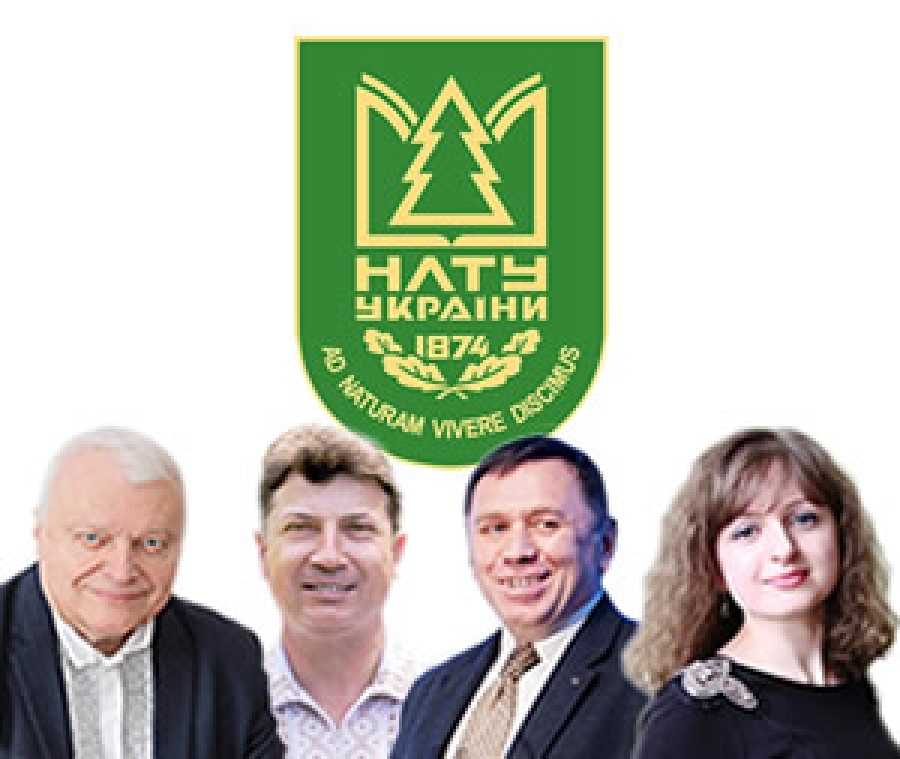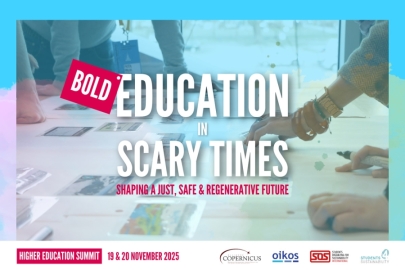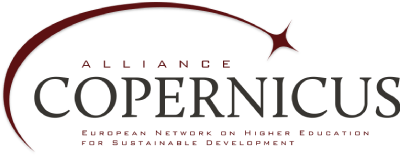#16 09/2025
Ukrainian National Forestry University
Volodymyr Zahorskyi (Rector)
Vasyl Lavnyy (Vice-Rector for Research)
Ihor Soloviy (Professor, Inst. of Social Sciences, Administration and Law)
Uliana Pavliuk (Deputy Director, Inst. of Computer Science and Information Technologies,
UI GreenMetric Ranking coordinator)
| _ |
"In the face of war |
COPERNICUS Alliance (CA) Your university has a long-standing history dating back to the 19th century. It is the only university in Ukraine fully specialized in the field of forest-based industry research and well-known for forestry education and science in Ukraine and Eastern Europe. How does sustainability shape your university's mission, and in what ways has its significance evolved over time?
Volodymyr Zahorskyi It is with sincere appreciation that we acknowledge your recognition of the Ukrainian National Forestry University’s historical legacy and specialization. As the only university in Ukraine fully dedicated to forest-based industry research and education, we carry a profound responsibility to advance sustainability – not only as an academic pursuit but as a societal imperative. Sustainability shapes the very foundation of our university’s mission. Since our establishment in 1874, we have evolved from a technical forestry institution into a multidisciplinary hub for ecological innovation, policy engagement, and community resilience. Today, sustainability informs our governance, curriculum design, research priorities, and partnerships.
The significance of sustainability has deepened in recent decades, especially in light of global climate challenges and Ukraine’s post-war recovery needs. Our academic programs now emphasize interdisciplinary approaches, combining forestry with land and water management, circular bioeconomy, and nature-based solutions. We’ve also aligned our research and teaching with the UN Sustainable Development Goals (SDGs), particularly SDG 15 (Life on Land), SDG 13 (Climate Action), and SDG 4 (Quality Education).
As Rector, I have prioritized the transformation of our university into a real center of excellence for sustainability-oriented forestry education in Eastern Europe. In the face of war we believe that sustainability is not only a framework for environmental stewardship – it is a pathway to national green recovery, institutional renewal, and global solidarity.
We are honored to engage with the COPERNICUS Alliance and remain committed to fostering transformative education, collaborative research, and shared leadership for a sustainable future.
Ihor Soloviy Historically, our university was founded to advance forest science and train professionals capable of managing Ukraine’s vast forest resources. Today, that mission has expanded to embrace a holistic understanding of sustainability – one that integrates ecological integrity, economic viability, and social equity. We view forests not only as natural assets but as dynamic systems that underpin climate stability, biodiversity, and rural livelihoods through a broad set of ecosytem services.
As a Chair of the Commisiom on Greening of Education of the University Methodological board I would like to mention that we are actively transforming our university into a sustainable university. Key initiatives include:
- Embedding enviromental impact assessment methodologies and green technologies into academic programs and research.
- Expanding international collaboration through Horizon Europe, Erasmus+, and the COPERNICUS Alliance.
- Advancing green campus practices and participatory forest restoration and afforestation.
- Supporting interdisciplinary research that bridges science, policy, and practice.
CA The war in Ukraine has been present in our media and in our minds and hearts for several years now. Naturally, our members are eager to understand how you manage to continue teaching and research under such challenging circumstances. Could you share some insights into this very unusual sense of “normality”?
Volodymyr Zahorskyi The continuation of teaching and research during wartime is not merely an institutional achievement – it is a testament to the unwavering spirit of our academic community. Despite air raid sirens, displacement in war zone areas, and infrastructural challenges, the active participation of our teachers and graduates in the defense of Ukraine our faculty and students have demonstrated extraordinary resilience.
We have restructured our operations to ensure safety and continuity. Hybrid learning models, flexible scheduling, and psychological support systems have become integral. Our international partners have played a crucial role, offering not only academic collaboration but humanitarian assistance and solidarity.
This unusual sense of “normality” is shaped by a shared understanding: education must not stop. Knowledge must not be silenced. Research must continue – especially research that contributes to ecological restoration, social cohesion, and post-war recovery.
We are proud of our community’s strength and adaptability. And we are deeply grateful to the COPERNICUS Alliance and the broader academic world for standing with us. Together, we reaffirm that even in times of war, education remains a pillar of peace.
Ihor Soloviy The notion of “normality” in wartime is paradoxical. It is not a return to what was, but a recalibration of purpose, resilience, and solidarity. Teaching and research have become acts of defiance against despair – tools through which we preserve intellectual continuity and cultivate hope.
At our university, we’ve adapted swiftly. Online platforms have become lifelines for academic exchange. Fieldwork continues, often in safer regions or through remote sensing technologies. Our students, many of whom are displaced or volunteering in civil defense, remain deeply committed. Their courage inspires us to keep going.
Also, the research priorities have shifted. We now explore post-war forest recovery, nature-based solutions for displaced communities, and the role of forests in psychological resilience. International collaboration has been vital – not only for resources, but for moral support. The sense of global academic solidarity has helped us feel less isolated.
In truth, this “normality” is fragile. But it is also deeply human. It reflects our determination to protect knowledge, nurture future leaders, and rebuild a country where sustainability is a necessity.
CA You mentioned that you have adapted your teaching and research approaches, placing greater emphasis on online and hybrid learning as well as on providing psychological support. While these changes were prompted by the current situation, do you believe these experiences could have a positive long-term impact on your activities?
Uliana Pavliuk That's a good question. These experiences have already had a positive impact on our teaching and research practices. The transition to online and hybrid learning has shown us new ways to make education more accessible, flexible, and safe. Students from remote areas and those with mobility challenges can now participate more actively in learning. Recorded lectures and asynchronous materials help them better understand complex topics at their own pace.
We have also integrated digital tools like learning management systems and innovative learning e-content to enhance interactivity and engagement (such as Moodle, H5P content, etc.). Collaborative platforms have improved teamwork in both teaching and research projects. Another significant benefit has been the expansion of international cooperation through virtual guest lectures and seminars. This allows us to connect with experts worldwide without the need for travel.
At the same time, we have placed greater emphasis on psychological support, creating peer groups and organizing mental health workshops and webinars. This approach has directly contributed to maintaining our first-place position in the national competition for the UI GreenMetric World University Rankings, as it reduces our environmental footprint and demonstrates leadership in sustainable university campus management. And, of course, we plan to expand green digital practices further to reinforce this achievement in the coming years, supported by ambitious updates to our strategic plan developed within the British Council Programme for Academic Managers framework. So, despite the circumstances, we’re eager to transform our institution into a more resilient, inclusive, sustainable, and future-oriented one.
CA Many of us feel very helpless about the military aggression you are undergoing. Are there any forms of cooperation from CA and/or our members that could be helpful? Is there anything else you want to say to our members?
Vasyl Lavnyy Thank you very much for this question and for your concern. In Ukraine, we are going through incredibly difficult times because of the ongoing military aggression, and sometimes it does feel overwhelming. What helps most is to know that we are not alone – that colleagues and friends across Europe and the world stand with us. From the side of the COPERNICUS Alliance and its members, there are several forms of cooperation that can be very meaningful:
- Solidarity and visibility: continuing to speak out publicly against the aggression and to keep Ukraine present in academic and civic discussions. This strengthens our resilience and ensures our situation is not forgotten.
- Academic cooperation: maintaining and expanding opportunities for Ukrainian students, researchers, and institutions to participate in joint projects, exchange programs, and networks. This helps us sustain education and science despite the war.
- Practical support: where possible, sharing access to resources (such as online libraries, courses, or infrastructure) and offering placements for displaced students and academics.
- Long-term collaboration: planning for reconstruction and sustainability after the war is also vital – your expertise and partnerships will be crucial when we move from surviving to rebuilding.
Most of all, please know that your messages of support and your willingness to cooperate truly matter to us. They give us strength and hope. We deeply appreciate the solidarity shown by COPERNICUS Alliance members, and we look forward to continuing our joint work for a sustainable and peaceful future.
CA Thank you very much for sharing these honest insights, which help us gain a better understanding of your situation. We will continue to show our support and we hope you’ll soon be able to focus mainly on academic activities again!
Contact Vasyl Lavnyy:







